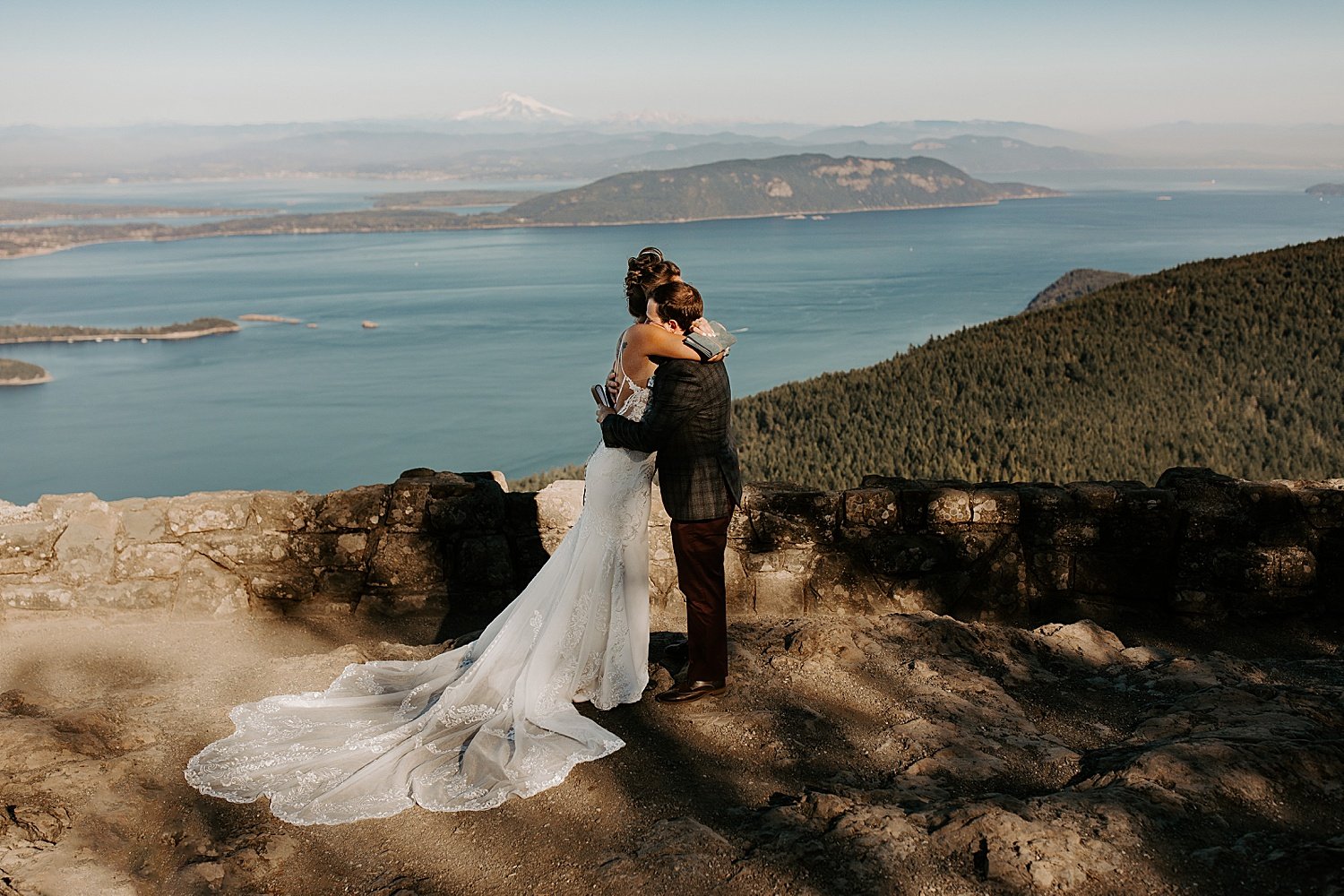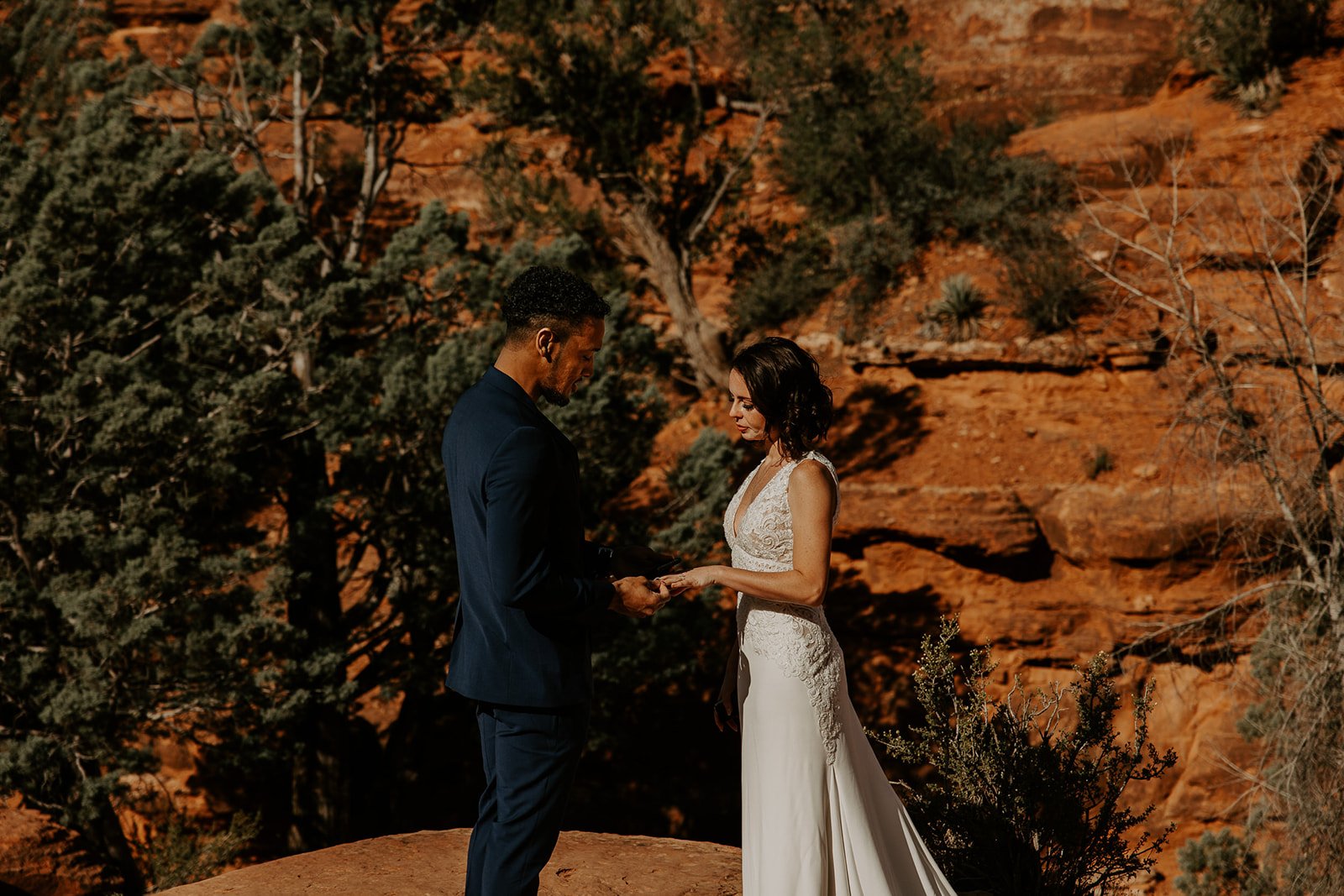What is a Commitment Ceremony & Do We Need a Marriage License?
Can we get married without a marriage license?
I hear this question fairly often. There’s a decent amount of mystique surrounding elopements, with many people (especially family and friends of the engaged couple) wondering if they’re “real” weddings.
The short answers are: yes, elopements are very, very real and no, you cannot legally get married without a marriage license. But (yes, there’s a but!) you can have a marriage ceremony in which the two of you commit your lives to one another called a commitment ceremony.
What is a commitment ceremony?
A commitment ceremony is almost identical to a wedding in that two people declare their love and commitment for one another and exchange vows. The sole difference is that a commitment ceremony is not legally binding, whereas a wedding is.
Commitment ceremony vs. wedding
Outwardly, there are no differences whatsoever between a commitment ceremony and a wedding. Many couples invite guests and incorporate wedding traditions into their commitment ceremony like tossing a bouquet, cutting their cake together, and exchanging rings. In fact, I’ve heard stories of people attending a commitment ceremony who didn’t even realize that it wasn’t a “real” wedding — they’re that identical!
The difference, of course, is that when you leave your commitment ceremony, you’re still not legally married in any official capacity. The government will continue to recognize you both as individuals, not a married couple.
Why would a couple choose to have a commitment ceremony?
They cannot get married by law
Commitment ceremonies are ideal for people who legally cannot get married. This may apply to same-sex couples who live in a country where same-sex marriage is still prohibited (believe it or not, out of the nearly 200 countries in the world, only around 30 allow same-sex marriage!).
Another example: in some places, there’s a waiting period to get remarried after a divorce and, of course, you cannot marry someone new if you’re already married. If either of you has previously been married and the situation is a bit messy, a commitment ceremony may be a great option.
They don’t want to be legally married
There are a number of reasons why some people may not want to get married legally — financial or tax reasons, personal, family-related, even moral or religious. We don’t necessarily need to dissect them all here, but if there’s any reason you or your partner don’t want to legally get married, consider having a commitment ceremony instead.
They are inconvenienced by the process of getting legally married
Similarly to the point above, some people can’t (or simply don’t want to) hit the “pause” button to deal with all the legal red tape involved with getting married legally. For example, in some states, there’s a mandatory waiting period between applying for your marriage license and actually getting married and in others, you may be required to have an officiant and/or witnesses. Particularly if you’re traveling out of state for a destination elopement, these requirements can be cumbersome.
I’m obviously a huge advocate for marriage, but looking at it from a purely objective standpoint, legal marriage is just that: a legal contract of sorts, that comes with a lot of formalities and processes.
They got legally married prior to their wedding day
This is actually one of the most common reasons behind couples choosing to have a commitment ceremony. Some have a strictly legal “courthouse wedding” for various reasons — again, financial, religious, family-related, maybe medical — but later on, have a commitment ceremony that more closely resembles a traditional wedding (or an adventure elopement!).
Pros & cons of having a commitment ceremony
Pros
Get married wherever and whenever. There are very literally no rules when it comes to planning and hosting a commitment ceremony! You don’t have to worry about waiting periods or specific marriage license requirements, so you can simply decide on the perfect location, time, and date.
No paperwork. Remember that legal red tape I mentioned earlier? There is absolutely none if you have a commitment ceremony rather than a wedding. No marriage license, no finding your birth certificate, or figuring out your mother’s maiden name, nada!
Have your ceremony in language that’s meaningful. Often when couples choose to have a more traditional wedding (even if that actually means eloping!), there are certain standards and guidelines dictating their day. When you remove the “red tape” and have no rules to follow, though, it can simply be YOUR perfect day. Think about what’s meaningful to you as a couple, and what elements you’d like to include in your commitment ceremony.
Cons
You can’t claim benefits. By far the biggest disadvantage to having a commitment ceremony instead of a wedding is that you aren’t eligible for any sort of legal benefits. This may include adding one another onto a health insurance policy or being able to get tax breaks designed specifically for married couples.
Negativity from nay-sayers. You’ll never be able to please everyone and unfortunately, some people have negative attitudes toward commitment ceremonies. Keep your focus on what’s most important to the two of you, but prepare yourself for the fact that you’ll likely face scrutiny and skepticism, and some of your loved ones may think you’re being selfish or may not take your commitment ceremony seriously.
You’ll have two anniversaries. Some couples, especially those who choose to legally marry at a later date, have a difficult time deciding which is their “real” anniversary — the date of their commitment ceremony or the date of their legal wedding.
How to plan a commitment ceremony
Planning a commitment ceremony is truthfully not much different than planning an elopement or a more traditional wedding — except that you could argue there’s less stress involved! Start the planning process by asking yourself…
Where do you want to get married? Remember, there are no hard-and-fast “rules” here, so go all-in and pick a dream destination!
What activities do you want to do on your wedding day? See above! This is your day and it can look however you want it to, so imagine what the ideal day looks like for you two and start taking actionable steps to put it into motion. The sky’s the limit: off-roading, riding in a hot-air balloon, hiking, whitewater rafting… your day, your adventure.
Do you want to invite guests? Or just the two of you? Just like a “traditional” elopement (as if there’s such a thing!), it’s 100% up to you whether or not you have guests in attendance. If you do decide to invite guests, keep in mind that you may need to choose a location and activities to accommodate some of them.
Do you want someone to officiate your ceremony? Or self-solemnize? You don’t necessarily need to worry about this from a legal standpoint for a commitment ceremony, so that may help make your decision easier. It is still an important aspect in terms of the logistics and planning, of course, but it’s helpful that you don’t have to worry about the laws regarding officiants or self-solemnization with a commitment ceremony.
Planning a commitment ceremony can be broken down into 5 stages, just as you would do with an elopement!
I created a super-thorough Elopement Planning Guide & Checklist covering the five stages of elopement planning. Here are the highlights:
Stage 1: Dream and Brainstorm. Make this fun and consider having a brainstorming date night!
Stage 2: Research and Logistics. Start doing research to see what’s actually feasible.
Stage 3: Make choices and start booking. Narrow down options and book your favorite vendors.
Stage 4: Finalize details and get ready. Confirm everything and start prepping to GET MARRIED!
Stage 5: Be present and enjoy! You planned YOUR perfect day, so be sure to relax and take it all in.
The early stages of planning is a great time to contact a professional elopement photographer who can offer guidance on times of year, expectations, legal considerations, etc.
FAQs about commitment ceremonies
Who officiates a commitment ceremony? Since it’s not legally binding, anyone can officiate! Yes, that means a family member, friend, or even one of you!
Can you have a commitment ceremony while still married? Technically yes, because again, commitment ceremonies aren’t legally binding. There may be some other complications involved here, though, so it’s best to do some research on the legal implications regarding this in your state and maybe even contact a marriage attorney.
Is a commitment ceremony legally binding? NO. This is the sole difference that sets a commitment ceremony apart from a wedding or elopement.
Can you change your last name after a commitment ceremony? Yes, anyone can go through the formal legal process of changing their name for any reason. Laws vary from state to state, so the best thing to do is research this in your state.
What do you say at a commitment ceremony? The best things to say during a commitment ceremony are whatever is truly in your heart. The fact that you came to the decision to have a commitment ceremony to begin with indicates how special you are to one another, so let that guide your words on your big day.
A commitment ceremony truly allows for the freedom to get married your own way. The stress of formal legal processes is removed, so you can relax and be 100% present with one another. And while it is indeed much less stressful than planning a traditional wedding or even elopement, there are still several considerations with regards to logistics and planning.
This is where a professional elopement photographer can really be a huge asset. I have experience shooting all types of weddings and, yes, commitment ceremonies, and I’d be honored to help with yours. Contact me today and let’s start discussing your dream day!















